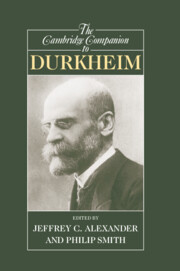Book contents
- Frontmatter
- 1 Introduction: the new Durkheim
- Part I: Life, context, and ideas
- Part II: Symbols, rituals, and bodies
- Part III: Solidarity, difference, and morality
- 12 Durkheim, solidarity, and September 11
- 13 Is Durkheim a class analyst?
- 14 Durkheim’s society revisited
- 15 Beyond solidarity? Durkheim and twenty-first century democracy in a global age
- Further reading
- Index
14 - Durkheim’s society revisited
from Part III: - Solidarity, difference, and morality
Published online by Cambridge University Press: 28 April 2008
- Frontmatter
- 1 Introduction: the new Durkheim
- Part I: Life, context, and ideas
- Part II: Symbols, rituals, and bodies
- Part III: Solidarity, difference, and morality
- 12 Durkheim, solidarity, and September 11
- 13 Is Durkheim a class analyst?
- 14 Durkheim’s society revisited
- 15 Beyond solidarity? Durkheim and twenty-first century democracy in a global age
- Further reading
- Index
Summary
Few of our contemporaries remember, and fewer still deserve to be rebuked if they do not, that when it first appeared in the vocabulary of incipient and inchoate sociology the word “society” was but a metaphor, and a metaphor of the most common, “here-like-there” kind, a kind usually deployed with the intention to domesticate something strange and make intelligible something heretofore unfamiliar and baffling. After all, two centuries or so have passed since that word had been deployed in metaphorical capacity. The mark of well-chosen and persuasive metaphors is that their metaphorical - interpretative - nature tends to be quickly forgotten and is no more noted. True to its metaphorical status, the word “society” was originally meant to focus attention on some otherwise blurry facets of the thing of which it claimed to be (newly) referent, thereby playing down the significance of that thing's confusing (and for that reason alarming) idiosyncrasy.
The facet of human experience which it was hoped would be laid bare or insinuated by the choice of “society” as the metaphor for the setting of human life-pursuits, was that of “being in company.” According to the Oxford English Dictionary, “fellowship,” “companionship,” “association with one's fellow men, esp. in a friendly or intimate manner” were the oldest meanings of the word “society.” There were other meanings too, all preceding the adoption of the word for metaphorical purposes - like “a number of persons associated together by some common interest and purpose” (first recorded in 1548); “the state or condition of living in association, company or intercourse with others of the same species”; “adopted by a body of individuals for the purpose of harmonious co-existence or for mutual benefit, defence, etc.” (1553); “a corporate body of persons having a definite place of residence” (1588); or the “aggregate of persons living together with a more or less ordered community” (1639).
- Type
- Chapter
- Information
- The Cambridge Companion to Durkheim , pp. 360 - 382Publisher: Cambridge University PressPrint publication year: 2005
- 9
- Cited by



